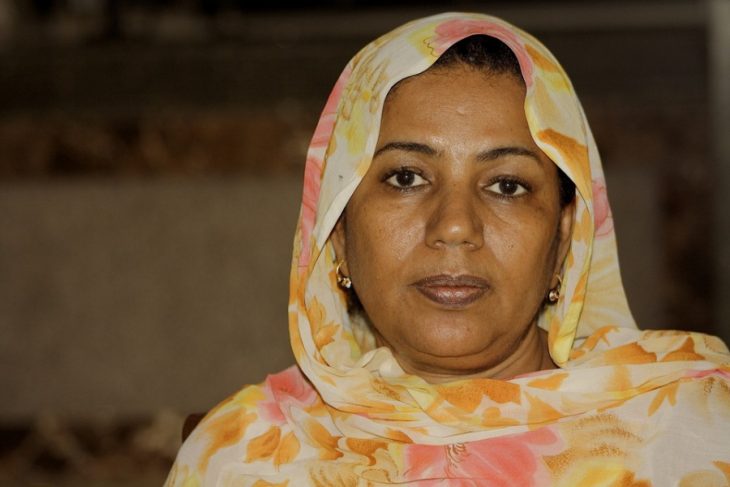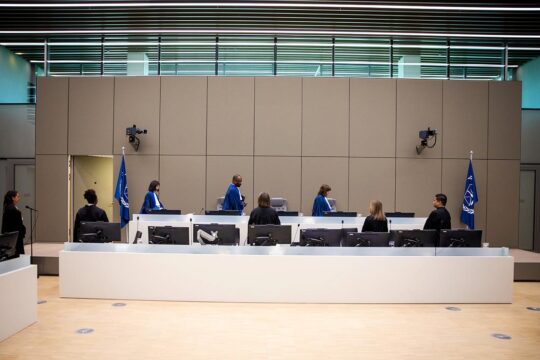Jurist Nina Oualet Intallou from Kidal in northern Mali is First Vice-President of the country’s Truth, Justice and Reconciliation Commission. She is the daughter of a gendarme crushed to death in 1992 by a Malian army tank and buried in a mass grave with 12 other members of her Touareg community. She is also a member of the National Movement for the Liberation of Azawad, the MNLA. In an interview with JusticeInfo, Nina Oualet Intallou, 54, says neither her membership of a former rebel group nor the assassination of her father will affect her desire for the truth to be revealed, because Malians have come back “from the brink”.
JusticeInfo: What are the underlying reasons for these recurring conflicts in the North of Mali?
Nina Oualet Intallou: First of all, there have been a series of injustices and a lack of reparations after painful events in the post-independence period from 1963 up to now. There have always been agreements, but they have never been implemented because the crises have never been tackled at their root. There is a lack of balance and fairness in the implementation mechanisms of these accords. The declaration of independence was not well received, because there was no satisfactory explanation of the situation after the colonial powers left. That provoked the rebellion of 1963 which was put down with violence. There were civilians killed, wells poisoned, women tortured and raped. For example, the 1990 rebellion was sanctioned by the 1992 Tamanrasset agreement, but this agreement was never fully implemented. On top of that, there is a lack of justice, because the killers are still free. They have never been tried.
JusticeInfo: Why did you become a member of the MNLA? Did your father’s murder play a role?
NOI: I joined the struggle against injustice before my father was killed, even if the murder of a parent is hard to forget. His murder made me realize that injustice was only increasing, which is why I joined the struggle of people who had decided to set it right.
Justiceinfo: What role did you play in the MNLA when you were a refugee in Mauritania?
NOI: I mainly gave advice and support as a political leader of the Movement. In particular I lobbied humanitarian organizations to take care of us as refugees living in very difficult conditions. I then participated in all the stages of the negotiations from Ouagadougou to Algiers until we got the signing of the Peace and Reconciliation Accord for Mali that was the result of the Algiers process.
JusticeInfo: Are you ready to forgive the murderers of your father?
NOI: Forgiveness is human, forgiveness is divine, but it necessarily comes after a mea culpa, because otherwise it may have negative effects.
JusticeInfo: Given this painful personal experience and your membership of the MNLA, do you think you will be able to be sufficiently impartial in your work for the Commission?
NOI: If I were not able to be impartial, I would not have accepted a post in this institution, the Truth, Justice and Reconciliation Commission.
JusticeInfo: Do you not fear that having representatives of armed groups in the Commission may one day paralyze it?
NOI: Once the armed groups have signed the agreement, they cannot paralyze the work of the Commission, unless they come up against bad faith from the other side.
JusticeInfo: What is your reaction to critics who say that you still support independence for the North?
NOI: My reaction can only be the one that is wise when faced with people who clearly just want to cause harm because they have nothing interesting to say.
JusticeInfo: Do you think women are represented enough in the Commission?
NOI: No, they are not sufficiently represented. Hardly 25% of Commission members are women. I would have liked that to be higher.
JusticeInfo: What will be your contribution to the process of emerging from crisis?
NOI: As part of the peace and reconciliation process, I will do everything I can as First Vice-President of the Commission to help establish the truth and let everyone know the root causes of this crisis. If there is no truth and justice, then we will have done nothing. You know, we were close to a genocide in Mali. We have come back from the brink!
JusticeInfo: Do you have a message for the people of Mali?
NOI: I would like to call for the commitment of all the parties -- the Malian State, through the government, the groups that have signed the Accord and of which I am a member, civil society, the political parties and the international community, so that our country can emerge forever from this spiral of crises. I stress that the Accord we have all signed must be fully implemented. And we need to make sure that there is justice for everybody. May all those who have committed crimes answer for their acts so that we can have forgiveness and reconciliation.






